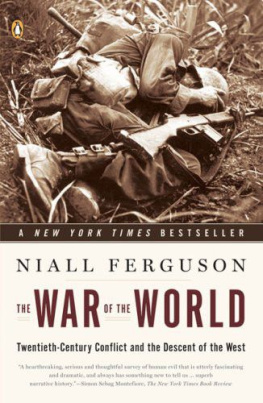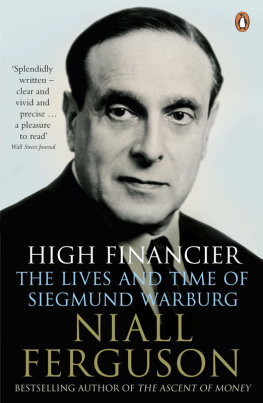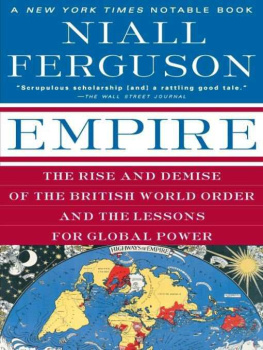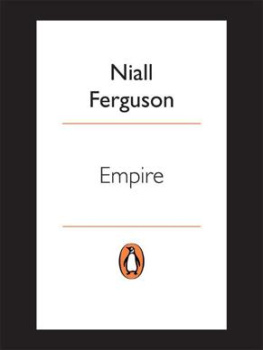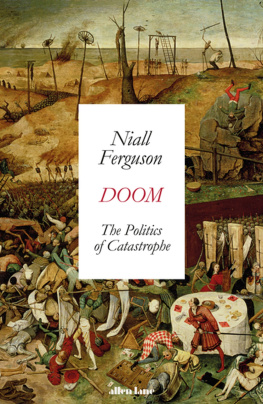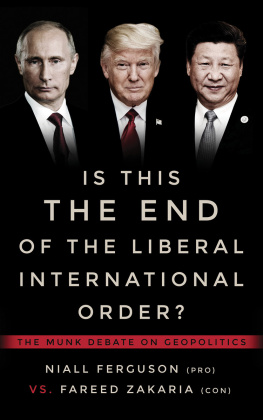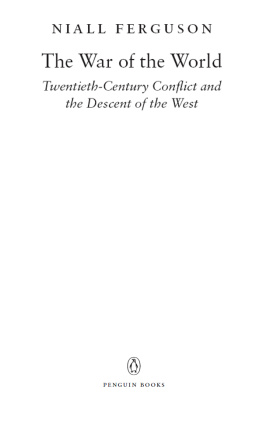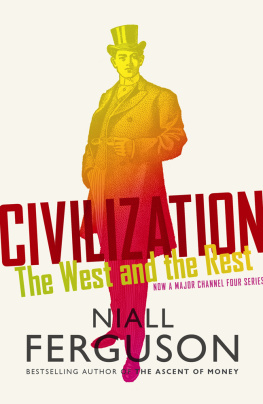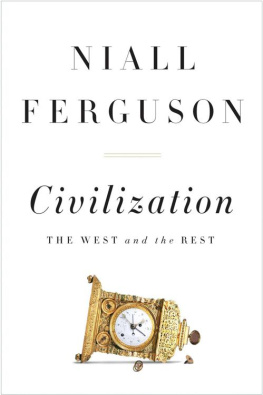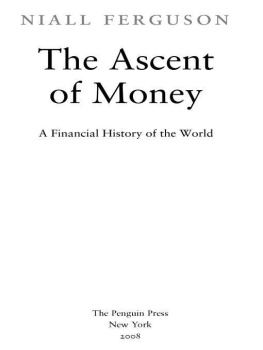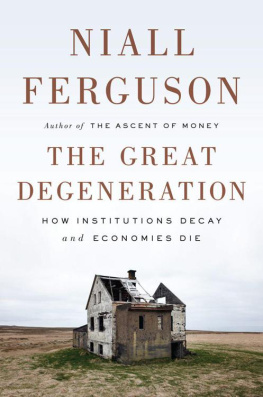Table of Contents
WORLD WAR II, we have been told all our lives, was our greatest triumph, the moment when the forces of light, the Western democracies, prevailed over the forces of darkness, the Nazis and the other Axis powers, in a conflict the latter started in 1939 and which ended with their defeat six years later. In this extraordinarily brilliant and vivid book, Niall Ferguson challenges our enduring assumptions about what was, without question, the most titanic struggle the planet has ever seen. The War of the World redefines the Second World War as the central act of an epicfifty-yearstruggle between rival empires. Far from culminating in the triumph of the West, this struggle was part of an inexorable shift in the global balance of power toward the East. The central question Ferguson poses and answers is why that shift had to be so appallingly violent.
What made the twentieth centuryan age of unprecedented material and scientific advancealso the most violent in all history? What went wrong with modernity? The stock explanations, Niall Ferguson demonstrates, are inadequate, whether they blame military technology, extreme ideology or dictatorial demagogy. For none of these can tell us why violence was so heavily concentrated in certain placesCentral and Eastern Europe, Manchuria and Koreaand at certain times, above all the 1940s. The key, he argues, was the lethal coincidence of three forces: economic volatility, ethnic disintegration, and the end of empires.
The world of 1900 was in many ways as globalized as our own. Markets for goods, labor and capital were integrated as never before. Men and women had never mingled so freely as they did in cities like London, Berlin and Shanghai. Yet it was precisely such cities that were devastated in what Niall Ferguson calls the War of the Worlda war waged against innocent civilians not by some ruthless alien invader, as H. G. Wells had imagined, but by their fellow human beings.
An epic historical narrative that takes the reader from the fields of Flanders to the plains of Poland, from the walls of Nanjing to the beaches of Normandy, The War of the World is Niall Ferguson's masterpiece. I k brings to life an age in which the irregularities of boom and bust tore apart multicultural communities; an age poisoned by the hateful idea of irreconcilable racial differences; above all, an age of imperial endgames in which the agonizing death throes of old empires coincided with the rapid rise and fall of new and ruthless empire-states.
Only by adopting the indiscriminately violent methods of total war could the Western powers defeat these enemies. Yet military victory could not arrest that descent of the West which, Ferguson argues, was the true arc of the twentieth century.
Drawing on a pioneering combination of history, economics and the cutting-edge interdisciplinary study of human violence, The War of the World is a revolutionary reinterpretation of the modern era.
NIALL FERGUSON is Laurence A. Tisch Professor of History at Harvard University, a Senior Research Fellow of Jesus College, Oxford University, and a Senior Fellow of the Hoover Institution, Stanford University. The bestselling author of Paper and Iron, The House of Rothschild, The Pity of War, The Cash Nexus, Empire and Colossus, he also writes regularly for newspapers and magazines all over the world. Since 2003 he has written and presented three highly successful television documentary series for British television: Empire, American Colossus and, most recently, The War of the World. He, his wife and their three children divide their time between the United States and the United Kingdom.
BY THE SAME AUTHOR
Colossus: The Rise and Fall of the American Empire
Empire: How Britain Made the Modern World
The Cash Nexus: Money and Power in the
Modern World, 1700-2000
The Pity of War
The House of Rothschild
Where be these enemies? Capulet, Montague,
See what a scourge is laid upon your hate,
That heaven finds means to kill your joys with love.
Romeo and Juliet, V.III
What is that sound high in the air
Murmur of maternal lamentation
Who are those hooded hordes swarming
Over endless plains, stumbling in cracked earth
Ringed by the flat horizon only
What is the city over the mountains
Cracks and reforms and bursts in the violet air
Falling towers
Jerusalem Athens Alexandria
Vienna London
Unreal
The Waste Land, V















A note on transliteration and other linguistic conventions
There are at least seven different systems for the transliteration of Mandarin Chinese into Roman characters. Broadly speaking, the English-speaking world switched from one system (Wade-Giles) to another (Hanyu Pinyin) towards the end of the period covered by this book, partly in response to its official adoption by the People's Republic of China and the International Organization for Standardization. Thus, to take perhaps the most obvious example, Peking became Beijing.
On the advice of colleagues who specialize in Asian history, I have adopted the Pinyin system, despite the obvious risk of anachronism. The exceptions are those earlier Wade-Giles romanizations (notably Yangtze, Chiang Kai-shek and Nanking) which have become too familiar to readers of English for it to be anything but confusing to replace them. Similar problems arise with the romanization of Russian names. I have tried as far as possible to use the Anglo-American BGN/ PCGN system.

